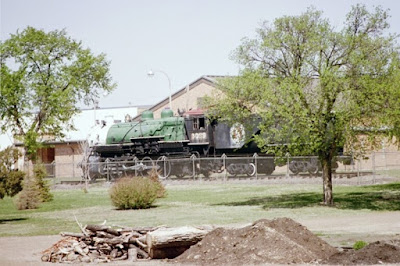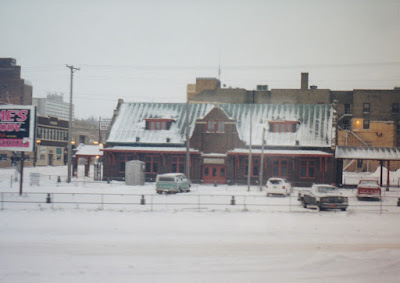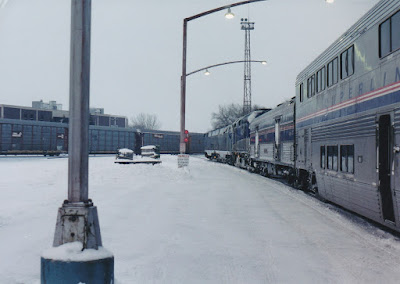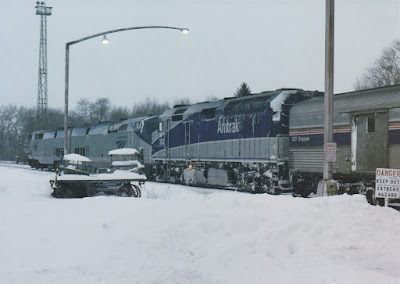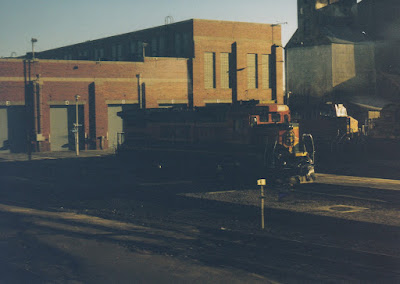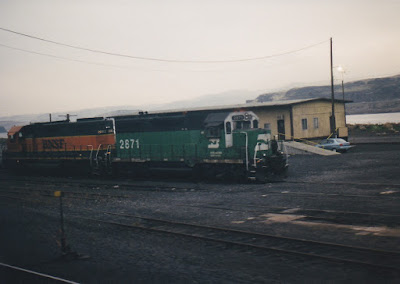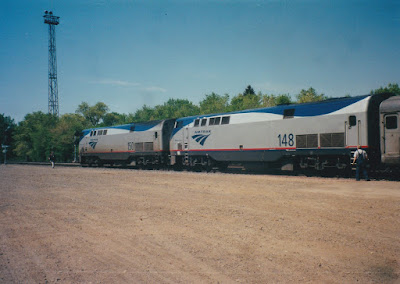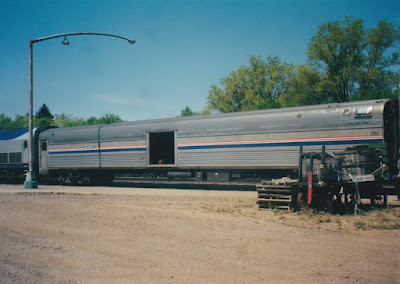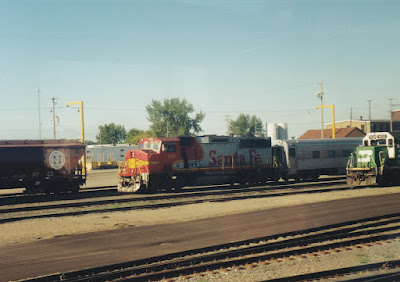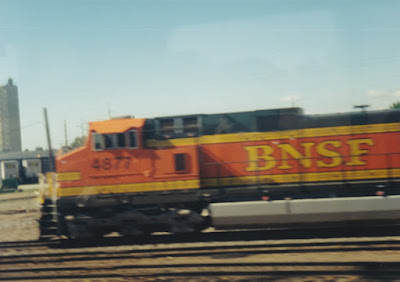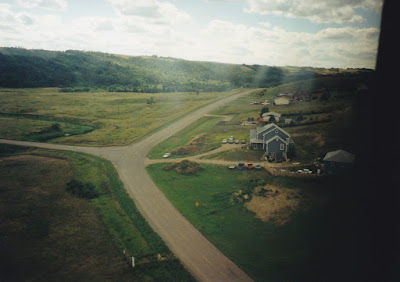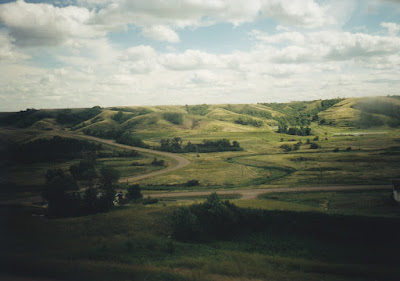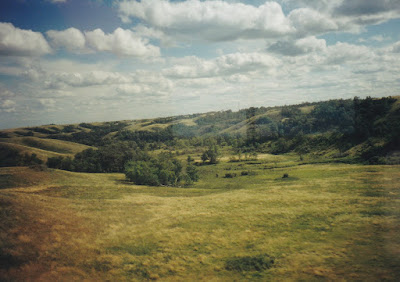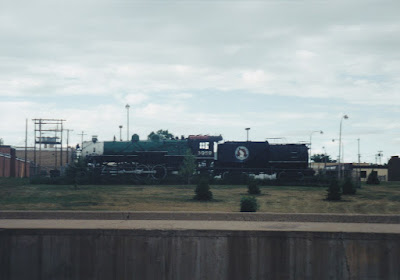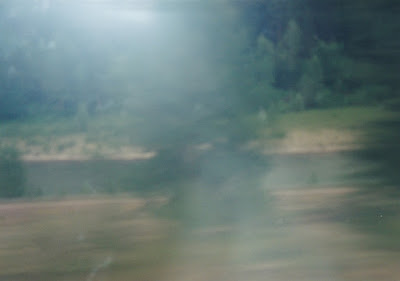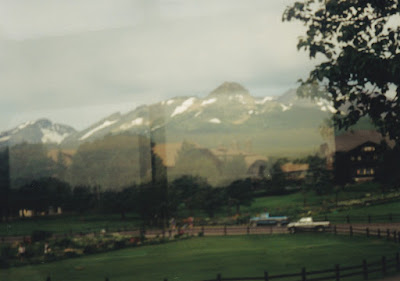My dad, Cliff West, took this pictures of Great Northern O-1 Class 2-8-2 #3059 from the train during the westbound Empire Builder’s station stop at Williston, North Dakota, in May 2004. The Great Northern had a total of 145 O-1 Class 2-8-2 Mikados built by the Baldwin Locomotive Works in four groups between August 1911 and February 1919, and the last of them were retired in April 1958. Built in February 1913, #3059 was one of the last 15 in operation when it was retired in December 1957, and is the only survivor. It was donated to the City of Williston and placed on display in Railroad Park on August 2, 1958.
Sunday, November 5, 2023
Sunday, March 27, 2022
Trains in Minot and Williston in September 2003
I took these pictures while riding Amtrak’s eastbound Empire Builder on September 5, 2003. The Empire Builder’s Heritage Baggage Car for this trip was Amtrak #1851, which I photographed during the train’s service stop in Havre, Montana. This car was built by the St. Louis Car Company in 1953 as U.S. Army (USAX) Hospital Ward Car #89566. It became Amtrak “Le Pub” Bar-Lounge Car #3405 in March 1974 and was used in service on the Montrealer between Washington DC and Montreal, and notably featured an electric piano. In June 1982 it was rebuilt as a baggage car with head-end power and became Amtrak 1178. In 1998 it was refurbished for service on the Adirondack between New York City and Montreal, becoming Amtrak #1851 and receiving large advertising murals for the Adirondack. It was one of several Amtrak baggage cars to be decorated for trains in the Northeast. By this time the car had been transferred into general service, but retained its special paint scheme.
I photographed
Great Northern O-1 Class 2-8-2 #3059 from the train during the eastbound Empire Builder’s station stop at Williston,
North Dakota. The Great Northern had a total of 145 O-1 Class 2-8-2
Mikados built by the Baldwin Locomotive Works in four groups between August
1911 and February 1919, and the last of them were retired in April
1958. Built in February 1913, #3059 was one of the last 15 in operation
when it was retired in December 1957, and is the only survivor. It was donated
to the City of Williston and placed on display in Railroad Park on August 2,
1958.
Sunday, March 20, 2022
Riding Amtrak's Westbound Empire Builder in December 2002
I took these pictures on December 21, 2002, while riding Amtrak’s westbound Empire Builder. This historic depot was built in 1912 and once served the Minneapolis, St. Paul & Sault Ste. Marie Railroad, or Soo Line, which is now part of the Canadian Pacific Railway. This depot is no longer owned by the railroad. It is located in Minot's historic downtown district and houses the Old Soo Depot Transportation Museum.
This depot is the one currently served by Amtrak. It is located just west of the old Soo Line depot, on the opposite side of the U.S. Highway 83 overpass. This depot was originally built in 1910 by the Great Northern Railway. A major renovation in 1975 replaced the original gabled roof with a flat roof, covered the original brick with stucco and remodeled the interior. Here Amtrak's Empire Builder can be seen making its station stop. Just to the north of the depot, on the other side of the tracks and past some trees, is the Souris River.
Just to the west of the Amtrak station, and visible from its platform, is crossing of the Burlington Northern-Santa Fe Railroad and the Canadian Pacific Railway. In this 2002 photo, Amtrak's Empire Builder is stopped on the BNSF track and the freight train crossing in front of it is on the CP track. This crossing is the busiest rail crossing in the state of North Dakota. The building visible behind the Canadian Pacific freight train is the Minot Public Library.
During the Empire Builder’s service stop in Minot, North Dakota, I braved the winter snow to check out the motive power consist and discovered Amtrak #383, a 3,000-horsepower F40PHR that was built by the Electro-Motive Division of General Motors in July 1981 using parts from retired Amtrak SDP40F #518. It is painted to match the Pacific Surfliner equipment used in southern California between San Luis Obispo and San Diego.
Pictured in Havre, Montana, Burlington Northern Santa Fe #3441 is a 1,500-horsepower SW1500 that was built by the Electro-Motive Division of General Motors in January 1973 as St. Louis-San Francisco (also known as the Frisco) #356. The Frisco was merged into the Burlington Northern on November 21, 1980, and this locomotive became Burlington Northern #61. Burlington Northern classified EMD’s SW1500s as SW15s. Following the merger of the Burlington Northern and the Atchison, Topeka & Santa Fe on September 22, 1995, this locomotive became Burlington Northern Santa Fe #3441 on February 19, 1998, and was repainted in Burlington Northern Santa Fe's "Heritage I" paint scheme on April 28, 2000.
Also in Havre near the shops, Burlington Northern Santa Fe #8615 is a 4,000-horsepower Dash 8-40B that was built by General Electric in June 1988 as Atchison, Topeka & Santa Fe #7425. Following the merger of the Burlington Northern and the Atchison, Topeka & Santa Fe on September 22, 1995, this locomotive became Burlington Northern Santa Fe #8615 on January 12, 2000, and was repainted in Burlington Northern Santa Fe’s “Heritage I” paint scheme on December 16, 2000.
I took this picture the next day on December 22, 2002, while riding the Portland section of Amtrak’s westbound Empire Builder through Wishram, Washington. Unless running extremely late, the Empire Builder generally made an extended station stop in Wishram to allow cigarette smokers an opportunity to satisfy their addiction, as the smoking car was part of the train’s Seattle section. I merely turned my attention and my camera to the railroad equipment outside the window. Burlington Northern #2871 is a GP39M that was originally built by the Electro-Motive Division of General Motors in February 1964 as Southern Pacific #7452, a 2,500-horsepower GP35. After 1965 it was renumbered to Southern Pacific #6564. It was retired in January 1991 and was sold to Morrison-Knudsen of Boise, Idaho, who rebuilt it into 2,300-horsepower GP39M Burlington Northern #2871 in July 1991. With it is Burlington Northern Santa Fe #2083, a 2,000-horsepower GP38-2 that was built by the Electro-Motive Division of General Motors in May 1972 as Burlington Northern #2083. Following the merger of the Burlington Northern and the Atchison, Topeka & Santa Fe on September 22, 1995, this locomotive became Burlington Northern Santa Fe #2083 and was repainted in Burlington Northern Santa Fe's "Heritage I" paint scheme on October 2, 2000.
Saturday, June 20, 2020
Amtrak Empire Builder at Minot, North Dakota, in December 2001
I took these pictures of Amtrak’s westbound Empire Builder during its service stop in Minot, North Dakota, on December 22, 2001.
Amtrak #150 is a 4,250-horsepower P42DC that was built by General Electric in March 2001.
Amtrak #148 is another 4,250-horsepower P42DC that was built by General Electric in February 2001.
Amtrak Baggage Car #1761 was originally built by Budd in 1953 as Atchison, Topeka & Santa Fe 48-Seat Coach #2860. After the formation of Amtrak in 1971 it became Amtrak #4872. It was converted to Head-End Power in June 1980 and was renumbered to Amtrak #4737. In October 1996 it was rebuilt into Amtrak Baggage-Mail Car #1719. In April 2000 it was converted to a mail-only configuration and renumbered as Amtrak #1761.
Tuesday, January 1, 2019
Riding the Westbound Empire Builder through Minnesota & North Dakota
On July 31, 1999, I was riding Amtrak's westbound Empire Builder from Milwaukee, Wisconsin, to Vancouver, Washington. This train was running very late, (we were actually taken from Milwaukee to Midway Station in St. Paul by bus) but it did allow me to see some scenes that the train normally passed in darkness, such as Burlington Northern Santa Fe's yard in Dilworth, Minnesota, just east of Fargo, North Dakota. Parked here with some passenger cars was Atchison, Topeka & Santa Fe #119, a 3,800-horsepower GP60M that was built by the General Motors Locomotive Group in London, Ontario, in June 1990.
Burlington Northern #1532 was originally built by the Electro-Motive Division of General Motors in April 1956 as Great Northern 684, a 1,750-horsepower GP9. After the Great Northern was merged into the Burlington Northern, it became Burlington Northern #1836 It was retired on June 15, 1992, and was sent to Morrison-Knudsen in Boise, Idaho, on September 25, 1992, to be rebuilt as an 1,800-horsepower GP28M, with its 567C prime mover fitted with a 645C upgrade kit, a new control stand, dynamic brakes, a Dash 2 electrical system, an AR10E1 alternator, a centralized air filtration system, and a GP38-2-style carbody with a GP50 cab. It was completed on January 10, 1993, as Burlington Northern #1532.
Burlington Northern Santa Fe #2278 is a 2,000-horsepower GP38-2 that was originally built by the Electro-Motive Division of General Motors in July 1973 as St. Louis-San Francisco (also known as the Frisco) #423. The Frisco was merged into the Burlington Northern in 1980, and this locomotive became Burlington Northern #2278. It retained its number through the September 22, 1995 merger of the Burlington Northern and the Atchison, Topeka & Santa Fe, being repainted into Burlington Northern Santa Fe's "Heritage I" paint scheme on June 22, 1998. In addition to being repainted, it has also had its headlight moved into the nose following Santa Fe practice.
The westbound Empire Builder was scheduled to make its station stop in Fargo, North Dakota, at 3:44 AM, but it was well after sunrise when I photographed Burlington Northern Santa Fe #4877, a 4,400-horsepower Dash 9-44CW that was built by General Electric in September 1998, from the train as it passed through Fargo.
Pictured in Minot, North Dakota, Burlington Northern Santa Fe #1067 is a 4,400-horsepower Dash 9-44CW that was built by General Electric in November 1996. The westbound Empire Builder was normally scheduled to pass through Minot in daylight, making a service stop there in the morning from 8:36 to 8:56, but the sun was high in the sky by the time this train got there.
Burlington Northern #6227 is a 1,750-horsepower SD9 that was originally built by the Electro-Motive Division of General Motors in April 1959 as Colorado & Southern #832, The Colorado & Southern was a subsidiary of the Chicago, Burlington & Quincy, and after the CB&Q was merged into the Burlington Northern in March 1970, Colorado & Southern locomotives retained their numbers and reporting marks. These locomotives began to be renumbered into Burlington Northern's main numbering system in December 1978, and this locomotive became Colorado & Southern #6227 and finally Burlington Northern #6227. It was still in service in Minot after the Burlington Northern Santa Fe merger.
Burlington Northern Santa Fe #4993 is a 4,400-horsepower Dash 9-44CW that was built by General Electric in December 1998. It is pictured here at the engine terminal in Minot, North Dakota.
Just west of Minot, the Empire Builder crosses one of the largest trestles on its route. The Gassman Coulee Trestle is a steel girder trestle that was built in 1899, replacing a wooden trestle that was blown down by a tornado. It is 1,792 feet long and 117 feet high. This is a view from the trestle.
The Gassman Coulee Trestle crosses over County Road 12W near the intersection with 62nd Street SW, as seen here in another view from the trestle.
Here is another view from the Gassman Coulee Trestle. This low area is aptly named Trestle Valley.
Here is another view of the scenery west of Minot.
The westbound Empire Builder was scheduled to stop at Williston, North Dakota, at 11:03 AM, but the evening light was already starting to fade when I photographed Great Northern O-1 Class 2-8-2 #3059 from the train during the Williston station stop. The Great Northern had a total of 145 O-1 Class 2-8-2 Mikados built by the Baldwin Locomotive Works in four groups between August 1911 and February 1919, and the last of them were retired in April 1958. Built in February 1913, #3059 was one of the last 15 in operation when it was retired in December 1957, and is the only survivor. It was donated to the City of Williston and placed on display in Railroad Park on August 2, 1958.
Wednesday, December 26, 2018
Riding the Eastbound Empire Builder through Montana & North Dakota
July 24, 1999 was the second day of my trip aboard Amtrak's eastbound Empire Builder to Milwaukee, Wisconsin. That morning, the train stopped alongside Great Northern NW3 #181 in Whitefish, Montana. Built by the Electro-Motive Division of General Motors in March 1942 as Great Northern #5406, this 1,000-horsepower diesel locomotive was the last of the only seven NW3s built, all for the Great Northern. It was renumbered to #181 in 1943. On August 30, 1965, the Great Northern sold #181 to Anaconda Aluminum in Columbia Falls, Montana, where it became their #900. When no longer needed, Anaconda Aluminum donated the locomotive to the Stumptown Historical Society in Whitefish, Montana. It was restored to Great Northern colors and placed on permanent static display next to the Whitefish depot on November 19, 1990.
East of Whitefish, Montana, the route of Amtrak's Empire Builder skirts the south edge of Glacier National Park as its parallels the Middle Fork of the Flathead River, as seen here near Nyack, Montana.
In addition to the Middle Fork of the Flathead River, Amtrak's Empire Builder also parallels U.S. Highway 2, which featured red-tinted pavement near Nyack, Montana.
The eastbound Empire Builder is climbing into the Rocky Mountains by this point. Shortly after passing Essex, Montana, the railroad passes through Snowshed #12, the first of a number of structures that protect the railroad from winter slides and avalanches. At the end of Snowshed #12 is this view of the Middle Fork of the Flathead River. The bridge carrying U.S. Highway 2 Bridge over the river is visible in the background.
The eastbound Empire Builder eventually crosses the Middle Fork of the Flathead River near Nimrod, Montana on Java Trestle, at the point where Java Creek flows into Middle Fork of the Flathead River. This view from Java Trestle shows the clear blue water of the Middle Fork of the Flathead River.
Leaving Glacier Park, the eastbound Empire Builder stops at East Glacier, Montana. Visible from the train during the station stop is the Glacier Park Lodge. The Glacier Park Lodge was built in 1913 by the Glacier Park Company, a subsidiary of the Great Northern Railway, and its design was based on the Forestry Building from the 1905 Lewis & Clark Centennial Exposition in Portland, Oregon.
As the eastbound Empire Builder continues out of the Rocky Mountains into eastern Montana. One of the major stops on this part of the trip is Havre, Montana, which is a service stop for the Empire Builder. If the Empire Builder is running on time, it will stop here for about 20 minutes, giving passengers an opportunity to step off the train and stretch their legs.
On static display next to the Amtrak depot in Havre is Great Northern steam locomotive #2584, an S-2 Class 4-8-4 that was built by the Baldwin Locomotive Works in 1930.
This locomotive is an example of the type of locomotives that pulled passenger trains like the Empire Builder through Montana during the age of steam.
A sign next to the locomotive tells its history:
THIS NORTHERN TYPE LOCOMOTIVE, SURVIVOR OF THE LAST STEAM ENGINES ACQUIRED BY THE GREAT NORTHERN RAILWAY FOR MAIN-LINE PASSENGER SERVICE, WAS PLACED ON PERMANENT EXHIBITION HERE ON MAY 15, 1964.
A POWERFUL AND SPEEDY LOCOMOTIVE, THIS ENGINE NOW LOOKS EVERY BIT THE ARISTOCRAT THAT IT WAS DURING THE YRS. OF ITS PRE-EMINENT ASSOCIATION WITH THE EMPIRE BUILDER AND THE ORIENTAL LIMITED. THE EMPIRE BUILDER WAS INAUGURATED ON JUNE, 1929, AND WAS PULLED BY A MOUNTAIN TYPE LOCOMOTIVE, BUT POPULARITY OF THE TRAIN LED TO ADDITION OF CARS TO THE CONSIST, AND THIS NECESSITATED MORE POWERFUL ENGINES.
IN 1930 GREAT NORTHERN ACQUIRED 14 CLASS S-2 STEAM LOCOMOTIVES FROM BALDWIN LOCOMOTIVE WORKS FOR SERVICE ON THE EMPIRE BUILDER AND THE FAST MAIL TRAINS. THIS ENGINE - No 2584 - IS THE LAST OF THE 14 ENGINES. SAMUEL VAUCLAIN, PRESIDENT OF BALDWIN DESCRIBED THE CLASS S-2 ENGINES AS "THE FINEST, MOST POWERFUL STEAM PASSENGER LOCOMOTIVES EVER BUILT UP TO THIS TIME." THESE ENGINES WERE OPERATED IN FREIGHT SERVICE AFTER THE EMPIRE BUILDER WAS STREAMLINED AND DIESEL POWERED IN 1947, AND WERE RETIRED IN 1955.
LOCOMOTIVE AND TENDER ARE 103 FEET 3 INCHES LONG, WEIGHT 764,680 POUNDS, AND HEIGHT FROM RAIL TO TOP OF STACK IS 16 FEET. No 2584 WAS AN OIL BURNER AND DEVELOPED 58,305 POUNDS OF TRACTIVE EFFORT. EACH OF THE 8 DRIVE WHEELS IS 80 INCHES HIGH.
THE TRACK ON WHICH No 2584 STANDS IS LAID TO THE GREAT NORTHERN MAIN LINE SPECIFICATIONS. THE CREOSOTED TIES ARE SUPPORTED ON A SUB-BALLAST CONSISTING OF 6 INCHES OF ROCK CHIPS AND A BALLAST CONSISTING OF SIX INCHES OF CRUSHED PINK QUARTZITE ROCK, BOTH OF WHICH ARE QUARRIED BY THE GREAT NORTHERN IN MONTANA. WELDED RAILS FULLY TIE PLATED AND ANCHORED, WEIGHT 115 POUNDS TO THE YARD.
After departing the Havre depot, the eastbound Empire Builder passes Burlington Northern Santa Fe's Havre yard and engine shop, where Burlington Northern Rotary Snowplow Power Units #972571 & #972570 are pictured. Both were originally built by the Electro-Motive Division of General Motors as 1,750-horsepower F9A diesel locomotives for freight service. Burlington Northern #972571 was built in September 1954 as Northern Pacific #7003A. After the Northern Pacific was merged into the Burlington Northern in March 1970, it became Burlington Northern #812. Burlington Northern #972570 was built in March 1956 as Northern Pacific #7011D. On April 11, 1966 it was reassigned to passenger service and renumbered to Northern Pacific #6704C. After the Northern Pacific was merged into the Burlington Northern in March 1970, it became Burlington Northern #9818. Following the creation of Amtrak in May 1971, it was transferred to freight service and was renumbered to Burlington Northern #784 in July 1973. Both of these locomotives were retired in December 1981 and rebuilt by Burlington Northern as Rotary Snowplow Power Units, or RSPUs. Their traction motors were removed and they were rewired so their diesel engines and main generators could provide power for a rotary snowplow.
Much later in the day, the eastbound Empire Builder reaches another service stop in Minot, North Dakota, where I managed to get a picture of the train's cook in the doorway of the dining car while it was being restocked.
Here are the locomotives for the eastbound Empire Builder being refueled in Minot. Amtrak #817 & #800 are 4,000-horsepower Dash 8-40BPs that were built by General Electric in 1993.
Just to the west of the Amtrak station in Minot, and visible from its platform, is a crossing of the BNSF Railway and the Canadian Pacific Railway. Seen here leading a westbound freight train, Canadian Pacific #8559 is a 4,400-horsepower AC4400CW that was built by General Electric in 1998.

